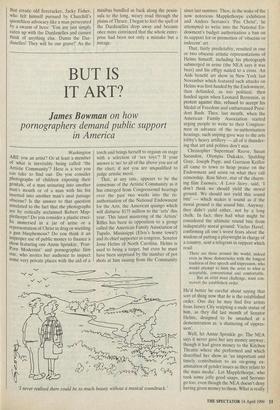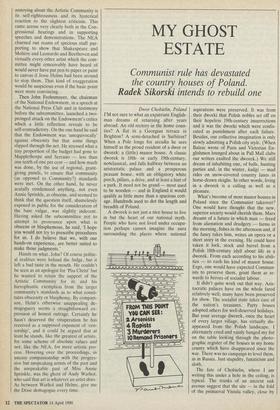BUT IS IT ART?
James Bowman on how pornographers demand public support in America
Washington ARE you an artist? Or at least a member of what is inevitably being called 'the Artistic Community'? Here is a test you can take to find out. Do you consider photographs of children exposing their genitals, of a man urinating into another man's mouth or of a man with his fist inserted into another man's anal passage obscene? Is the answer to that question unrelated to the fact that the photographs are by critically acclaimed Robert Map- plethorpe? Do you consider a plastic cruci- fix immersed in a jar of urine or a representation of Christ in drag or wielding a gun blasphemous? Do you think it an improper use of public money to finance a show featuring one Annie Sprinkle, 'Post- Porn Modernist' and pornographic film star, who invites her audience to inspect some very private places with the aid of a torch and brings herself to orgasm on stage with a selection of 'sex toys'? If your answer is 'no' to all of the above you are of the elect; if not you are unqualified to judge artistic merit. That, at any rate, appears to be the consensus of the Artistic Community as it has emerged from Congressional hearings over the past two weeks into the re- authorisation of the National Endowment for the Arts, the American quango which will disburse $175 million to the 'arts' this year. This latest mustering of the Artists' Rifles has been in opposition to a group called the American Family Association of Tupelo, Mississippi (Elvis's home town!) and its chief supporter in congress, Senator Jesse Helms of North Carolina. Helms is used to being a target, but even he must have been surprised by the number of pot shots at him issuing from the Community '1 never realised there could be so much beauty without a musical soundtrack.' since last summer. Then, in the wake of the now notorious Mapplethorpe exhibition and Andres Serrano's 'Piss Christ', he attempted to write into the National En- dowment's budget authorisation a ban on its support for or promotion of 'obscene or indecent' art.
That, fairly predictably, resulted in one or two obscene artistic representations of Helms himself, including his photograph submerged in urine (the NEA says it was beer) and his effigy nailed to a cross. An Aids benefit art show in New York last November which featured such attacks on Helms was first funded by the Endowment, then defunded, as too political, then funded again when Leonard Bernstein, in protest against this, refused to accept his Medal of Freedom and embarrassed Presi- dent Bush. Then, last month, when the American Family Association started urging people to write to their Congress- men in advance of the re-authorisation hearings, such sniping gave way to the arts lobby's heavy artillery — all of it thunder- ing that art and politics don't mix.
Christopher 'Superman' Reeve, Susan Sarandon, Olympia Dukakis, Spalding Gray, Joseph Papp, and Garrison Keillor all came to town to heap praise on the Endowment and scorn on what they call censorship. Ron Silver, star of the charm-
ing film Enemies, A Love Story, said, 'I don't think we should yield the moral
ground. We should not yield this sound bite' — which makes it sound as if the moral ground is the sound bite. Anyway, they didn't yield either, not by a long chalk. In fact, they had what might be considered the ultimate sound bite from indisputably moral ground: Vaclav Havel, confirming all one's worst fears about the wisdom of putting a playwright in charge of a country, sent a telegram in support which read:
There are those around the world, indeed even in those democracies with the longest tradition of free speech and expression, who would attempt to limit the artist to what is acceptable, conventional and comfortable. . . . But an artist must challenge, must con- trovert the established order.
He'd better be careful about saying that sort of thing now that he is the established order. One day he may find five artists from Jersey City sculpting a nude statue of him, as they did last month of Senator Helms, designed to be smashed at a demonstration as 'a shattering of oppres- sion'.
Well, let Annie Sprinkle go. The NEA says it never gave her any money anyway, though it had given money to the Kitchen Theatre where she performed and which described her show as 'an important and timely contribution to an on-going ex- amination of gender issues as they relate to the mass media'. Let Mapplethorpe, who took some jolly good snaps, and Serrano go too, even though the NEA doesn't deny having given money to them. What is really
annoying about the Artistic Community is its self-righteousness and its hysterical reaction to the slightest criticism. This came across very clearly both in the Con- gressional hearings and in supporting speeches and demonstrations. The NEA churned out reams of specious stuff pur- porting to show that Shakespeare and Moliere and Leonardo and Beethoven and virtually every other artist which the com- mittee might conceivably have heard of would never have put pen to paper or paint to canvas if Jesse Helms had been around to stop them. That kind of exaggeration would be suspicious even if the basic point were more convincing.
Then John Frohnmayer, the chairman of the National Endowment, in a speech at the National Press Club and in testimony before the subcommittee, launched a two- pronged attack on the Endowment's critics which a little reflection reveals to be self-contradictory. On the one hand he said that the Endowment was 'unequivocally' against obscenity but that some things slipped through the net. He stressed what a tiny proportion of the budget had gone to Mapplethorpe and Serrano — less than one tenth of one per cent — and how much was done, by the use of regional, grant- giving panels, to ensure that community (as opposed to Community?) standards were met. On the other hand, he never acutally condemned anything, not even Annie Sprinkle, as obscene, and seemed to think that the question itself, shamelessly exposed in public for the consideration of the base vulgar, was slightly indecent. Having asked the subcommittee not to attempt to pronounce upon what is obscene or blasphemous, he said, 'I hope you would not try to prescribe procedures for us. I do believe that we, with our hands-on experience, are better suited to make those judgments.'
Hands on what, John? Of course politic- al realities were behind the fudge, but it left a bad taste in the mouth. He couldn't be seen as an apologist for 'Piss Christ' but he wanted to retain the support of the Artistic Community for its and his hierophantic exemption from the larger community's standards as to what consti- tutes obscenity or blasphemy. By compari- son, Helm's otherwise unappealing de- magoguery seems a straightforward ex- pression of honest outrage. Certainly he hasn't deserved the vituperation he has received as a supposed exponent of 'cen- sorship', and it could be argued that at least he stands, like the greatest of artists, for some scheme of absolute values and not, like the NEA, for mere artistic pro- cess. Hovering over the proceedings, in uneasy companionship with the progres- sive but unspeaking artists of the past and the unspeakable past of Miss Annie Sprinkle, was the ghost of Andy Warhol, who said that art is whatever an artist does. As between Warhol and Helms, give me the Dixie demagogue every time.



















































 Previous page
Previous page